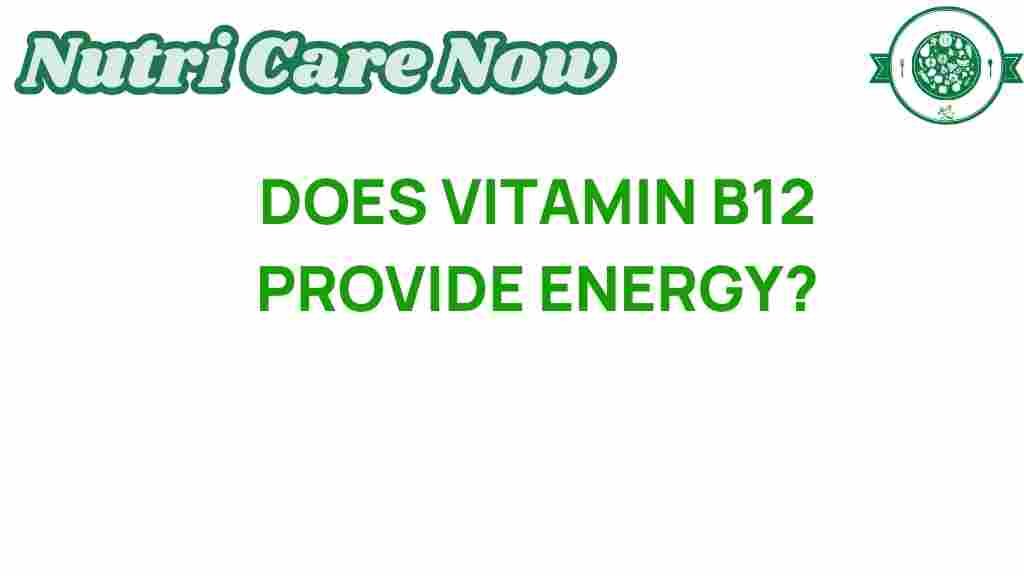Unlocking Energy: The Surprising Role of Vitamin B12
Are you feeling fatigued or low on energy? You might be surprised to learn that a deficiency in Vitamin B12 could be the culprit. This essential nutrient plays a vital role in energy production, metabolism, and overall health. In this article, we will delve into the many health benefits of Vitamin B12, its dietary sources, the importance of supplementation, and how it can help boost your energy levels and combat fatigue.
Understanding Vitamin B12 and Its Importance
Vitamin B12, also known as cobalamin, is a water-soluble vitamin that is crucial for numerous bodily functions. It is involved in:
- Red blood cell formation
- DNA synthesis
- Nerve function
- Energy metabolism
The body relies on Vitamin B12 to convert the food we eat into usable energy. Without sufficient levels, you may experience fatigue, weakness, and a host of other health issues.
Health Benefits of Vitamin B12
In addition to providing an energy boost, Vitamin B12 offers several other significant health benefits:
- Improved Mood: Vitamin B12 is known to play a role in the production of serotonin, a neurotransmitter that helps regulate mood.
- Enhanced Cognitive Function: Adequate B12 levels are linked to better memory and cognitive performance.
- Heart Health: Vitamin B12 helps lower homocysteine levels, an amino acid that, in high concentrations, can increase the risk of heart disease.
- Bone Health: Some studies suggest that Vitamin B12 may contribute to bone health and reduce the risk of osteoporosis.
How Vitamin B12 Boosts Energy
The primary role of Vitamin B12 in metabolism is to assist in the conversion of carbohydrates into glucose, which is then used for energy. Here’s a step-by-step process of how this occurs:
- Absorption: Vitamin B12 is absorbed in the intestines and stored in the liver.
- Conversion: It helps convert food into glucose, providing fuel for your body.
- Red Blood Cell Formation: B12 is essential for producing red blood cells, which transport oxygen throughout the body.
- Energy Utilization: With adequate oxygen and glucose, your body can produce the energy required for daily activities.
If you’re experiencing fatigue, it may be due to low levels of Vitamin B12, affecting your body’s ability to generate energy efficiently.
Dietary Sources of Vitamin B12
To avoid a deficiency, it’s crucial to include adequate sources of Vitamin B12 in your diet. Some of the best dietary sources include:
- Animal Products:
- Meat (beef, liver, chicken)
- Fish (salmon, trout, tuna)
- Dairy (milk, yogurt, cheese)
- Fortified Foods:
- Cereals
- Non-dairy milk (soy, almond, oat)
- Nutritional yeast
For vegetarians and vegans, it’s particularly important to seek fortified foods or consider supplementation, as plant-based diets may lack sufficient Vitamin B12.
Supplementation: When and How to Take Vitamin B12
If dietary sources are insufficient, supplementation may be necessary. Here’s how to approach it:
- Types of Supplements:
- Oral tablets
- Sublingual tablets
- Injections (for severe deficiencies)
- Recommended Dosage: The average adult needs about 2.4 micrograms of Vitamin B12 per day, but this may vary based on age, diet, and health conditions.
- Consult a Healthcare Professional: Before starting any supplementation, it’s advisable to consult with a healthcare provider, especially if you have underlying health issues or are pregnant.
Troubleshooting: Recognizing Vitamin B12 Deficiency
Understanding the signs of Vitamin B12 deficiency can help you take action before it leads to serious health issues. Common symptoms include:
- Fatigue and weakness
- Pale or jaundiced skin
- Nerve problems (tingling, numbness)
- Difficulty walking
- Memory loss
- Changes in mood (depression, irritability)
If you experience any of these symptoms, it’s essential to get tested for Vitamin B12 levels. A simple blood test can determine if you are deficient.
Conclusion: Energize Your Life with Vitamin B12
Vitamin B12 is a crucial nutrient for maintaining energy levels, supporting metabolism, and promoting overall health. Understanding its role in your body can help you make informed dietary choices or consider supplementation if necessary. By incorporating adequate dietary sources of Vitamin B12 and being aware of its health benefits, you can unlock a new level of vitality and energy.
For more information on nutrition and health benefits, check out this resource.
To learn more about how to boost your energy naturally, visit our energy-boosting tips page.
This article is in the category Health and created by NutriCareNow Team
